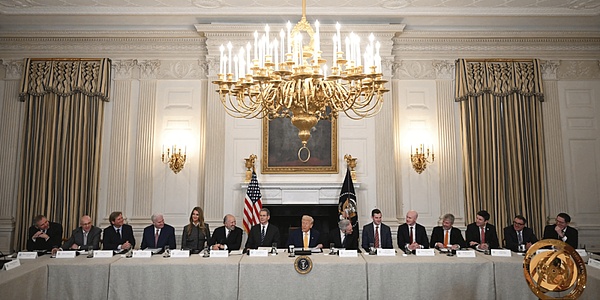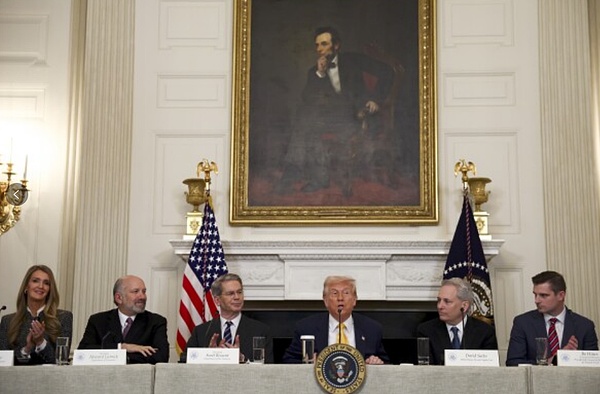Author: Tia, Techub News
This morning, the White House held a Crypto Summit, attracting heavyweight figures from government regulatory agencies, Congress, industry leaders, and the investment community. This summit marks a major shift in the US government's policy attitude towards the cryptocurrency industry, with stablecoin legislation, relaxed banking regulation, and cryptocurrency asset custody becoming the focus of attention.

The policy signals released by the meeting indicate that the US government is actively adjusting its regulatory attitude towards cryptocurrencies. The policy adjustments led by the Treasury Department have led the IRS to plan to revoke and amend its previous tax guidance on Bitcoin and cryptocurrencies, a move seen by the market as a major positive in reducing tax uncertainty.
At the same time, the OCC reiterated that the federal banking system can legally custody crypto assets, hold deposits as stablecoin reserves, and use blockchain technology to facilitate payment business. This not only provides compliance support for banks to venture into the digital asset business, but may also drive further integration between the banking and crypto industries.
In addition, the meeting revealed that some restrictive banking regulatory policies implemented during the Biden administration are being gradually withdrawn, including the so-called "Chokepoint 2.0" - the blockade of crypto companies by banks - which the Trump administration plans to abolish, and the OCC has also formally initiated the process of revoking the relevant guidelines. This means that the banking industry may become more actively involved in the cryptocurrency market, providing broader financial support for the industry's development.
Meanwhile, Trump clearly stated at the summit that he hopes Congress will pass stablecoin legislation before the August recess, indicating that regulators are accelerating the compliance of stablecoins and paving the way for their application in the global payment and financial system.
In addition to policy adjustments, the meeting also discussed industry innovation, market transparency, and ethical norms. The Trump administration has proposed a "Crypto Renaissance" program aimed at unleashing the growth potential of the crypto industry and driving economic growth through this field. It is also worth noting that Trump has downplayed the term "Cryptocurrency" in the meeting, preferring to use "Digital Asset" instead. This change in terminology may mean that the US government hopes to redefine the industry in a more broad and mainstream way to facilitate the entry of institutional investors.

David Sacks, the White House's AI and Cryptocurrency Supervisor, said in a subsequent speech that the cryptocurrency industry has suffered legal suppression and persecution over the past four years, and has been embroiled in a "legal war". He expressed gratitude to President Trump for his understanding of legal fairness and his willingness to fight for justice and fairness.
US Treasury Secretary Scott Bessent believes that with President Trump signing an executive order to formally establish a strategic Bitcoin reserve and digital asset reserve, the US will establish its leadership position in the global digital asset strategy. The US must recognize this reality and lead other countries in the digital age.
US Commerce Secretary Howard Lutnick, Small Business Administration Director Kelly Loeffler, House Majority Whip Tom Emmer, and Chainlink founder Sergey Nazarov also expressed their gratitude to President Trump for his efforts to promote cryptocurrency-related policies.
Coinbase CEO Brian Armstrong said after the summit that the company plans to add 1,000 new employees in the US, inspired by the clarification of regulations. This move indicates that a clear regulatory framework will directly drive industry development and attract companies to expand their investments in the US. In addition, the summit attracted the participation of many key industry figures, including SEC Commissioner Hester Peirce, CFTC Acting Chairman Caroline Pham, and Lightspark CEO David Marcus, further demonstrating the increasingly close dialogue mechanism between the government and the industry.
This White House Crypto Summit attracted many key industry figures, including Coinbase CEO Brian Armstrong, Lightspark CEO David Marcus, CFTC Chairman nominee Brian Quintenz, and Kresus founder and CEO Tegan Traina. In addition, SEC Commissioner Hester Peirce and CFTC Acting Chairman Caroline Pham also spoke at the event. It is worth noting that former SEC Chairman nominee Paul Atkins did not attend, and Acting Comptroller of the Currency Rodney Hood only attended the pre-meeting reception.
Overall, this White House Crypto Summit not only shows that the US government's attitude towards digital assets is changing, but may also lay the foundation for future regulatory frameworks. Stablecoin legislation, tax policy adjustments, and bank participation in the digital asset business will be the focus of industry attention in the coming months. If Congress can push through relevant legislation before the August recess, the crypto industry may see new development opportunities.








